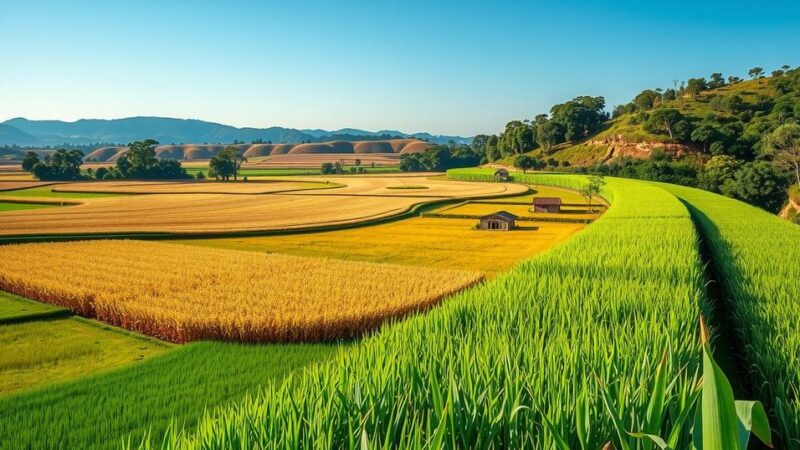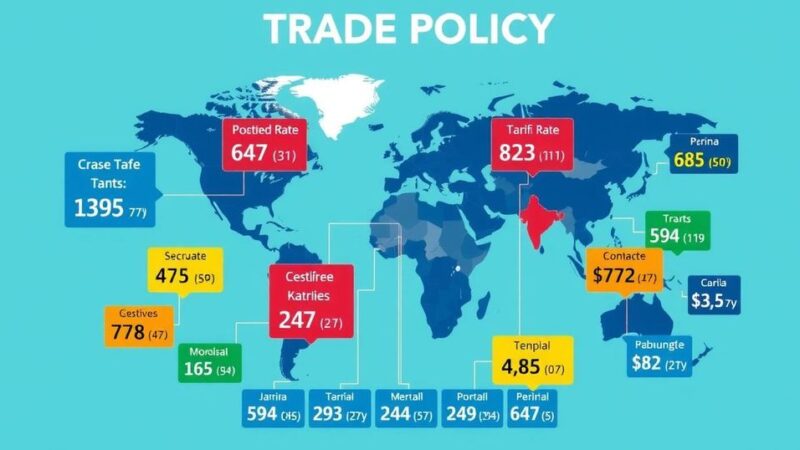Nigeria’s food inflation fell to 23.51% in February 2025 from 37.92% in February 2024, as reported by the NBS. While monthly prices rose at a slower rate of 1.67%, key staples like yam tubers and potatoes saw declines in price increases. Regional disparities showed Sokoto with the highest inflation at 38.34%, while Adamawa had the lowest at 12.18%.
In February 2025, Nigeria’s food inflation rate decreased markedly to 23.51%, a significant drop from 37.92% in February 2024, as reported by the National Bureau of Statistics (NBS). This decline reflects a moderation in food price increases; however, month-on-month data indicates that food prices continue to rise, albeit at a slower rate.
The report attributes this year-on-year decrease in food inflation partly to a revised base year for measurement. In terms of month-on-month increases, food inflation was recorded at 1.67%, indicating a reduced pace compared to January 2025. This suggests that while food costs are still increasing, the rate of inflation has leveled off, showing signs of improvement in market conditions.
Key food staples such as yam tubers, potatoes, soybeans, maize flour, cassava, and dried bambara beans have exhibited lower price increases in February. This decline might hint at enhanced supply conditions or diminished pressure from fluctuating exchange rates, both of which have historically impacted food price stability. The NBS report stated that the food inflation rate in February 2025 was 23.51% year-on-year, a reduction of 14.41% from the previous year.
The annual average rate of food inflation for the twelve months ending February 2025 was noted at 34.74%, slightly up from 30.07% in February 2024. Despite this easing of inflation, food prices remain a critical element of the overall inflationary landscape in Nigeria, contributing 9.28% to the headline inflation rate. Month-on-month, food prices accounted for 0.82% of this rate, illustrating that upward price pressures persist but at a diminished pace.
Regional variations in food inflation were also evident, with certain states experiencing more pronounced price increases. Sokoto led with a food inflation rate of 38.34%, followed by Edo at 35.08% and Nasarawa at 33.53%. These increases can be attributed to disruptions in supply chains, transportation expenses, and seasonal fluctuations influencing agricultural outputs. Conversely, states such as Adamawa, Ondo, and Oyo reported the lowest food inflation rates, with figures at 12.18%, 13.66%, and 15.55%, respectively, due to improved local production and reduced reliance on imports.
Month-on-month analysis revealed that Sokoto experienced the highest inflation increase at 18.83%, trailed by Nasarawa at 15.32% and Kogi at 11.65%. In contrast, states like Ondo, Kaduna, and Oyo reported declines in food prices, potentially due to local production enhancements or effective policy measures aimed at stabilizing food costs.
The decline in Nigeria’s food inflation to 23.51% in February 2025 indicates an easing of price pressures compared to the previous year. Findings suggest improving supply conditions and localized production improvements that may be contributing factors. Nevertheless, food prices continue to exert substantial influence on the overall inflation rate, with significant regional disparities highlighting the complexities of food price dynamics across the country.
Original Source: nairametrics.com






